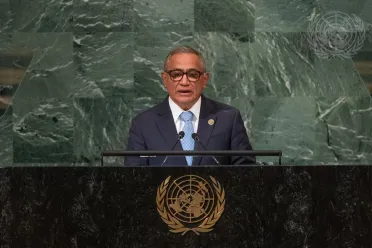Statement
Statement summary
JOHN A. BRICEÑO, Prime Minister of Belize, said that while the Russian Federation’s illegal, unprovoked attack on Ukraine has “shaken the foundations of the multilateral system”, the consequential crises the international community faces are not confined to the battlefield in Europe. Democratic norms and human rights are being rolled back, poverty is increasing, climate change is destroying the planet, and international cooperation has been supplanted by nationalism and unilateralism. Further, global food and petroleum prices have reached historic highs, and the lingering impacts of the COVID-19 pandemic and persistent supply-chain disruptions have contributed to skyrocketing inflation. These realities are exacerbating an already acute social situation in Belize, he said, where poverty has risen an estimated 10 per cent between 2018 and 2021 and an estimated 45 per cent of Belizeans are food insecure.
These realities also heighten climate risk, he said, underscoring that his country is “but one hurricane away from catastrophe”. Spotlighting woefully inadequate climate financing and crisis-level global debt, he called for a bold reimagining of the global financial architecture, rather than a “tinkering at the edges to conceive of additional programmes that are based on the same false logic”. The International Monetary Fund (IMF) is largely devoid of ways to quantify climate impacts on public debt and countries’ capacity to pay, and its obstinate focus on primary balances and debt-to-GDP ratios “ignores the empirical evidence that nature is in revolt”, he said. The world needs a new financial architecture that is willing and capable to identify systemic threats like debt and climate risk and then devise tools commensurate to the challenge.
While noting that Belize reduced its debt-to-GDP ratio from 133 per cent to 108 per cent last year through an innovative debt-for-nature swap — resulting in over $250 million in debt-service savings — he said that global forces are nevertheless determined to diminish his country’s aspirations for economic rebound. Over the last seven years, financial flows to small island developing States have declined and, paradoxically, those countries most vulnerable to climate change — and least able to fiscally adapt — do not qualify for concessionary financing. He therefore called on international financial institutions, multilateral development banks and development partners to use the multidimensional vulnerability index after it is finalized later this year. This will unlock financing for vulnerable countries, supporting their efforts to achieve the Sustainable Development Goals, adapt to climate change and build resilience. Vulnerable countries also need debt relief, he stressed.
Recalling that colonialism transported trillions in plundered wealth to the oppressors, he asked how much longer this new “climate colonialism” would punish the victims while sparing the victimizers. In this vein, he also called for the immediate lifting of the embargo on Cuba. Turning to Haiti, he called on the international community to advance a robust, comprehensive programme of support for the people of that country. Also calling for Taiwan to take its rightful place among the community of nations, he stressed that the outdated policy imposed on Taiwan to promote its exclusion must “yield to the greater good”. Additionally, Belize supports the realization of an independent Palestinian State. Recalling that Belize and Guatemala have been pursuing final resolution of the latter country’s claim to Belizean territory before the International Court of Justice, he said that his country continues to count on the international community’s support as the judicial process proceeds and, when it concludes, for the demarcation exercise that will be conducted.
Small island developing States, he observed, had great expectations for the 2021 United Nations Climate Change Conference. However, rather than world leaders meeting their commitments to deliver $100 billion annually, such States left Glasgow with a finance roadmap. “Another paper promise,” he pointed out. Instead of delivering a loss-and-damage mechanism, such States left with more words. “Let’s try this again,” he urged, calling for less talk and more decisions at the upcoming United Nations Biodiversity Conference in Montréal and the 2022 United Nations Climate Change Conference in Egypt. These must include agreeing on a framework that accounts for the economic costs of biodiversity, along with commitments to close the emissions gap, provide adaptation financing and establish a financing facility to substantively address loss and damage. “Anything less is a failure,” he stressed, and small island developing States do not have that option.
Full statement
Read the full statement, in PDF format.
Photo

Previous sessions
Access the statements from previous sessions.
